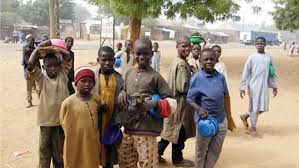In a country blessed with vast natural resources and a vibrant culture, a staggering 10.5 million children in Nigeria are being left behind. They are the out-of-school children, denied the chance to learn, grow, and reach their full potential. This crisis affects not only the individual children but also their families, communities, and the nation as a whole.
The consequences of this crisis are far-reaching and devastating. Without education, these children are doomed to perpetuate cycles of poverty, limiting their future prospects and undermining Nigeria’s economic and social progress. They are more likely to suffer poor health outcomes, be exploited, radicalized, or drawn into criminal activity. The impact on their mental health and well-being is also significant, leading to feelings of isolation, frustration, and disillusionment.

Poverty is a significant factor in this crisis, with many families unable to afford the costs associated with education. Cultural and social norms also play a role, particularly in the northern regions, where girls are often forced to drop out of school due to early marriage or gender discrimination. Insecurity and conflict have also had a devastating impact, destroying schools and displacing communities.
However, there are solutions to this crisis. Increased funding and resource allocation are critical, as is community engagement and awareness. Innovative educational models, such as mobile schools and distance learning programs, can also help reach children in challenging circumstances. Addressing the root causes of poverty, gender inequality, and insecurity is also essential.
Meet Aisha, a bright 12-year-old forced to drop out of school to support her family. Or Ibrahim, a curious 9-year-old who walks miles every day to attend a school with no desks or textbooks. Their stories are a testament to the resilience and determination of Nigeria’s children, but also a reminder of the immense challenges they face.
By working together, we can ensure that every child in Nigeria has access to quality education. Let us join forces to give Nigeria’s out-of-school children a second chance. Let us invest in their future and empower them to become the leaders, innovators, and change-makers Nigeria needs to thrive.
Together, we can transform this crisis into an opportunity for national renewal and progress. The future of Nigeria depends on it. We owe it to Aisha, Ibrahim, and the millions of children like them to act now and ensure that every child has access to the education they deserve.



